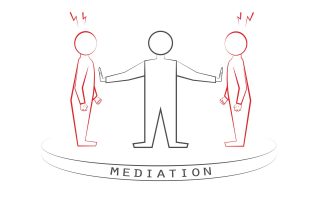Divorce mediation is among the most commonly used methods of bargaining a divorce settlement. In divorce mediation, you, your spouse or, if you and your spouse agree, both of you and a third party (your lawyer) hire a professional neutral third person, also known as a mediator to meet with you in order to discuss and possibly resolve all the legal issues in your divorce case. Mediation is a much faster and less expensive alternative to trying to settle all of your divorce disputes by yourselves, through divorce court. Mediation will also save you time and money, because you won’t have to spend months or even years preparing and filing divorce paperwork. Additionally, it may allow you to better think about the relationship between yourself and your future spouse.

There are a few things that you need to be aware of before you start divorce mediation. First of all, remember that no matter how qualified and experienced your divorce lawyer is, mediation is still just a form of legal negotiation, and as such it’s up to you to be very aware of what you’re agreeing to. This means that you need to make sure that your spouse’s lawyers know that you want them to be involved, and you also need to let your lawyers know how you feel about their involvement. You absolutely need to be comfortable with your divorce settlement negotiator; after all, they are there to help you, and you’ll be very uncomfortable if you do not completely trust him or her.
Your lawyer and/or spouse should also know about the typical divorce mediation process, so that they can prepare themselves accordingly. Divorce lawyers typically work on a contingency fee basis, which means that they receive no compensation if the divorce resolution is not successful. However, many divorces are successfully completed on an uncontested basis, meaning that both parties agree to a settlement that is agreeable to them, and that they find satisfactory for their individual futures. If your lawyer has experience in these types of negotiations, he or she will understand what needs to be accomplished and will be able to make sure that it is done in a way that benefits you as well as your spouse.
When you first sit down with your spouse and begin the divorce mediation process, there will probably be several issues that you would like to discuss with your spouse. For instance, you may be unhappy with the division of property, or you may wish to have children or other issues related to long-term family finances. Your spouse and his or her lawyers will then determine how much time is available to spend talking on the proposed settlement and will present this to you. Your lawyer will listen to what you have to say and will seek out an agreement with your spouse on the percentage of money that is to be divided, the schedule of payments, and other issues related to the divorce. Once your lawyer has presented all of your concerns to your spouse, a court date will likely be set, and an extensive negotiation process will begin.
It’s important to remember that there are typically several questions that your divorce mediation expert will ask you during this process. Many of these questions relate to the proposed agreement that was presented to you by your lawyer, as well as any additional information that you wish to include in the final agreement. There will be a variety of answers to these questions, some of which are commonly asked by many individuals who choose to use a divorce mediation process instead of a more formal trial. Here are some of the more frequently asked questions regarding mediation and the mediation process:
Q. What is divorce mediation? A. Divorce mediation is a process in which both parties are encouraged to communicate with one another in a relaxed, non-threatening environment. In addition to facilitating communication between both spouses, divorce mediation also helps the parties to evaluate their possible future relationship, and will allow them to come up with an agreement based on their current relationship, rather than basing their relationship on the prior marriage.
Q. Doesn’t my lawyer already help me with my case in a traditional court battle? A.
Q. Is a divorce mediation the same as a pre-trial battle? A. A pre-trial trial is the typical process where the attorneys attempt to prove their case in court, while a divorce mediation is much more uneventful and will allow both your attorneys to focus on building a stronger relationship with the mediator.

